Journey to Jiutian Shengmu Miao: A Pilgrimage to the Goddess of Nine Heavens

An Essential Guide to Visiting Jiutian Shengmu Miao
In This Guide
- An Essential Guide to Visiting Jiutian Shengmu Miao
- The Rich History and Legends of Jiutian Shengmu Miao
- Main Highlights: What You Absolutely Can’t Miss
- Planning Your Visit: A Practical Guide
- Tickets: Prices, Booking, and Tips
- How to Get There: A Complete Transportation Guide
- Local Cuisine and Accommodation Nearby
- Frequently Asked Questions
- Final Thoughts on Your Trip
Explore the Spirit of the Miao Culture at Jiutian Shengmu Miao
Nestled in the heart of Guizhou Province, Jiutian Shengmu Miao (九天圣母庙) is not just a place of worship; it is a vibrant tapestry woven with the threads of Miao history, culture, and spirituality. As you step into this sanctuary, the air is thick with the scent of incense and the melodic sounds of ancient hymns, inviting you into a world that feels suspended in time. This site is dedicated to the worship of the Holy Mother of Nine Heavens, a revered deity in Miao culture, embodying the rich spiritual beliefs and traditions of the Miao people.
Jiutian Shengmu Miao serves as a crucial cultural hub, attracting visitors eager to immerse themselves in the authentic experiences of the Miao minority. Whether you are a history buff, a cultural enthusiast, or simply a curious traveler, this temple offers an unparalleled glimpse into the Miao way of life, where rituals blend seamlessly with the natural beauty of the surrounding landscape.
What to Expect:
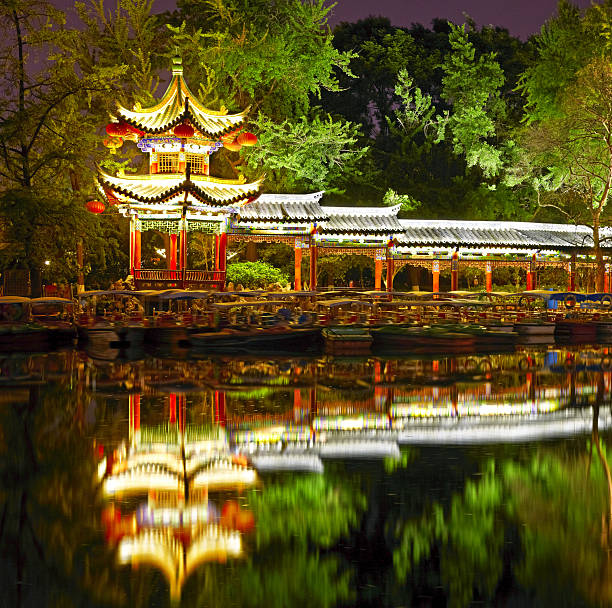
Jiutian Shengmu Miao.
- Cultural Performances: Engage with the locals through lively traditional dances and music that celebrate Miao heritage, often performed as part of temple ceremonies.
- Festivals and Events: If your visit coincides with one of the Miao festivals, such as the Flower Dance Festival, you will witness breathtaking displays of colorful costumes, intricate hairstyles, and communal celebrations.
- Local Cuisine: Don’t miss the opportunity to savor traditional Miao dishes, often characterized by their use of local herbs, rice, and unique cooking methods that have been passed down through generations.
As you wander through the temple grounds, be prepared to be enchanted by the intricate architecture and the warmth of the Miao people. Their hospitality is legendary, often welcoming visitors with locally brewed rice wine and heartfelt smiles. Jiutian Shengmu Miao is indeed a must-visit destination for anyone looking to uncover the layers of history and culture that define the Miao people. Prepare to be captivated by a journey that transcends mere tourism; it’s an invitation to connect with a living culture that thrives in the embrace of ancient traditions.

Jiutian Shengmu Miao.
The Rich History and Legends of Jiutian Shengmu Miao
Nestled in the heart of Guizhou Province, Jiutian Shengmu Miao (九天圣母庙) stands as a testament to the rich tapestry of Chinese cultural heritage, particularly that of the Miao ethnic minority. This ancient temple, dedicated to the revered goddess Jiutian Shengmu, is steeped in history and legends that captivate both locals and international travelers alike.
A Glimpse into History
The origins of Jiutian Shengmu Miao can be traced back to ancient times when the Miao people established their settlements in the rugged mountains of Guizhou. Renowned for their vibrant culture and deep-rooted traditions, the Miao have long worshipped a pantheon of deities, with Jiutian Shengmu holding a prominent place among them. The goddess is often associated with fertility, protection, and the blessings of nature, making her a central figure in Miao spirituality.
-
Cultural Significance: The temple itself is not merely a religious site; it serves as a cultural hub for the Miao people. Festivals, rituals, and celebrations held here are integral to preserving Miao traditions and passing them on to future generations. The temple becomes a gathering place during significant events, fostering a sense of community and belonging.
-
Architectural Marvel: The architecture of Jiutian Shengmu Miao is a reflection of traditional Miao design, characterized by intricate wood carvings, colorful murals, and ornate altars. The structure harmonizes with the natural landscape, embodying a deep respect for nature that is central to Miao beliefs.
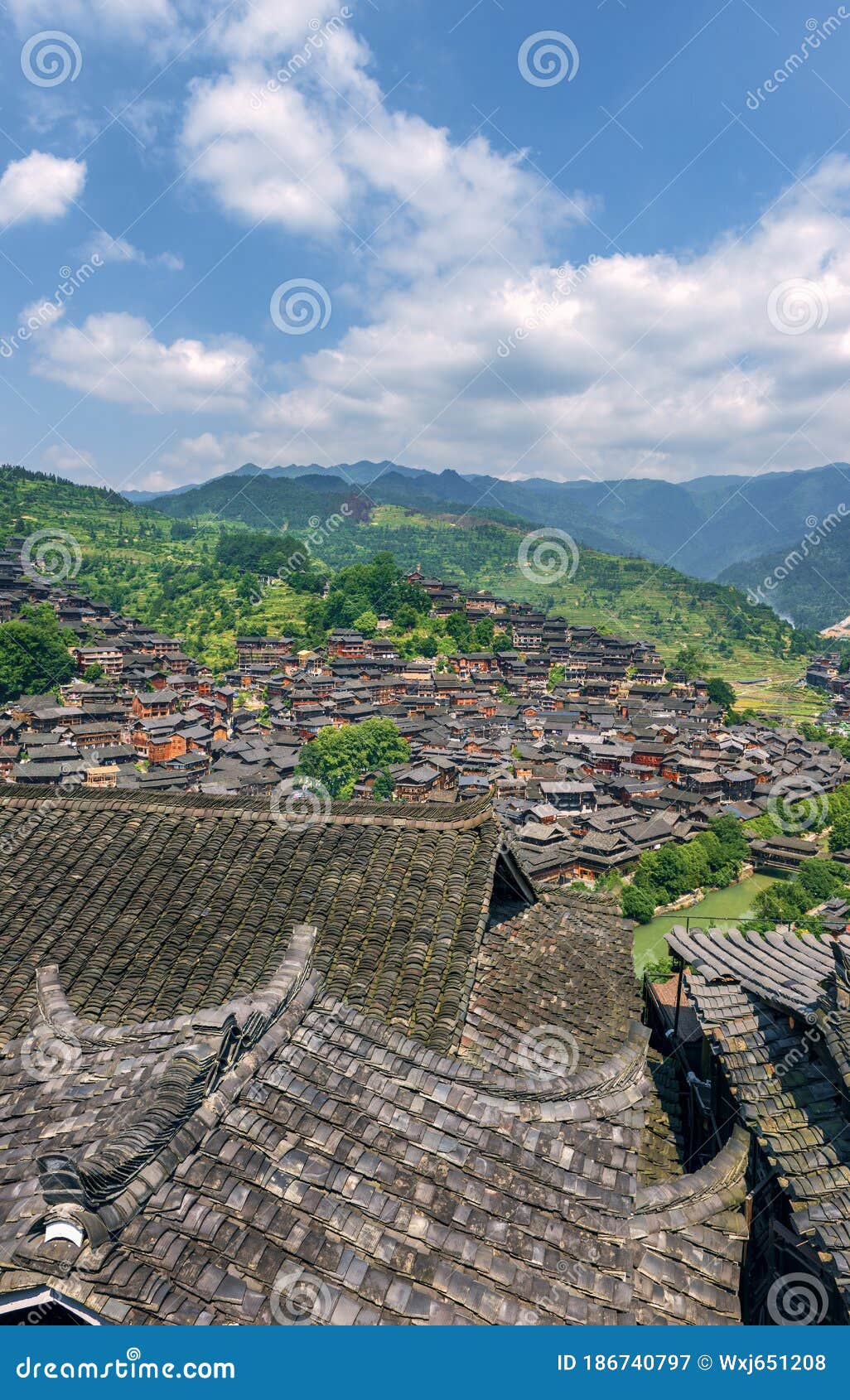
Jiutian Shengmu Miao.
Legends That Enchant
Legends surrounding Jiutian Shengmu add another layer of intrigue to this sacred site. One of the most popular tales recounts the story of how the goddess descended from the heavens to save the Miao people from famine and hardship. According to legend, Jiutian Shengmu appeared in a vision to the village elders, instructing them on agricultural practices that would ensure a bountiful harvest. In gratitude, the Miao built the temple in her honor, and it has since become a site of pilgrimage for those seeking her blessings.
- The Legend of the Golden Rice: Another enchanting tale speaks of a period when the Miao faced a devastating drought. In their desperation, they prayed fervently to Jiutian Shengmu for help. Miraculously, clouds gathered, rain fell, and golden rice began to sprout in their fields. This rice was said to have healing properties, symbolizing abundance and prosperity. To this day, the Miao celebrate this event during the Harvest Festival, honoring the goddess with offerings and traditional dances.
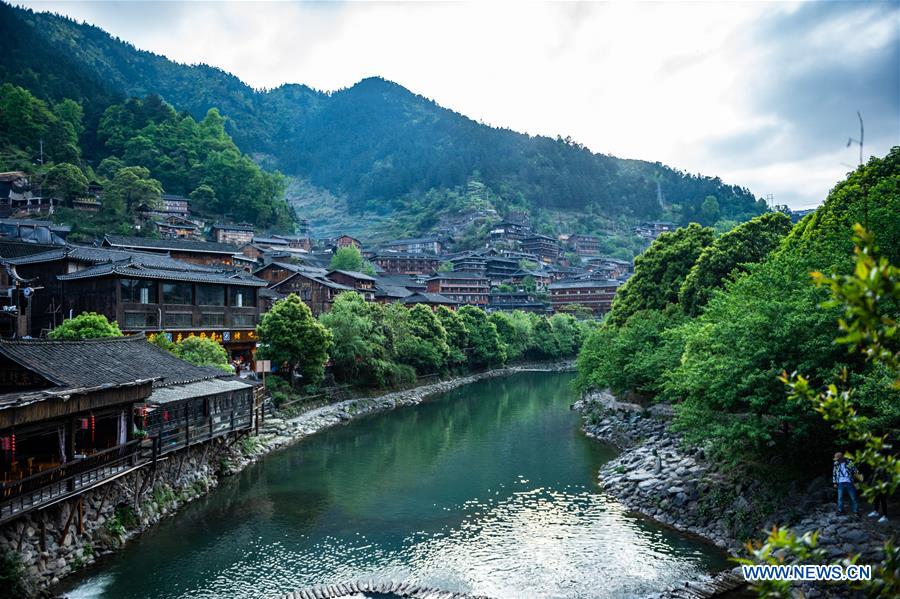
Jiutian Shengmu Miao.
The Cultural Experience
Visiting Jiutian Shengmu Miao offers travelers more than just a glimpse into Miao history; it provides an immersive experience in their vibrant culture. Travelers are often welcomed with traditional songs and dances, a warm introduction to the hospitality that typifies the Miao people. Guests may partake in local rituals, taste authentic Miao cuisine, and witness the intricate craftsmanship of local artisans.
-
Festivals: The temple is alive with festivities, especially during the annual celebrations dedicated to Jiutian Shengmu. These events showcase colorful attire, lively performances, and an atmosphere filled with joy and reverence.
-
Local Crafts: The Miao are also known for their exquisite handicrafts, including silver jewelry and embroidered textiles. Visitors can explore local markets and purchase these unique items, supporting the artisans and preserving their heritage.
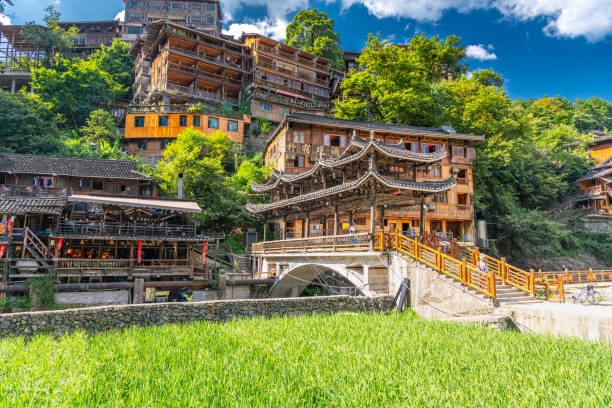
Jiutian Shengmu Miao.
Conclusion
Jiutian Shengmu Miao is more than just a temple; it is a living embodiment of the Miao people’s spirituality, history, and cultural pride. The legends that surround the goddess Jiutian Shengmu serve as a reminder of the resilience and creativity of the Miao community. For those who venture to this enchanting site, a journey through time awaits—an experience that connects the heart and soul of China’s diverse cultural landscape.
Main Highlights: What You Absolutely Can’t Miss
Discovering Jiutian Shengmu Miao (九天圣母庙)
Nestled in the vibrant heart of Kaili, Jiutian Shengmu Miao is more than just a temple; it serves as a captivating gateway into the rich tapestry of Miao culture and the historical depths of the region. Here are the main highlights that every traveler must experience when visiting this remarkable site.

Jiutian Shengmu Miao.
1. Architectural Marvels
- Traditional Miao Architecture: As you approach the temple, take a moment to admire the intricate wooden structures adorned with colorful carvings that reflect the unique artistic heritage of the Miao people. The temple’s design showcases traditional elements, including ornate roofs and decorative motifs that tell stories of their ancestors.
- Scenic Surroundings: The temple is situated amidst stunning mountainous landscapes and lush rice terraces, providing a picturesque backdrop perfect for photography enthusiasts. Don’t miss the chance to capture the tranquil beauty of the area.
2. Cultural Immersion
- Welcoming Ceremonies: Upon arrival, visitors are often greeted with traditional Miao music and dance performances. This warm welcome is not only entertaining but offers a glimpse into the vibrant cultural practices that are integral to the Miao community.
- Rice Wine Experience: Participate in the age-old custom of sharing rice wine, served from traditional vessels. It’s an immersive experience that allows you to engage with locals and understand their hospitality firsthand.

Jiutian Shengmu Miao.
3. Festivals and Events
- Tianhua (Flower Dance) Festival: If your visit coincides with this colorful festival, you are in for a treat. The festival features vibrant costumes, traditional dances, and rituals that celebrate Miao heritage. It’s a unique opportunity to witness the community come together in joyful celebration.
- Local Markets: Explore the Sunday market in Kaili, where Miao villagers gather to sell handicrafts, fresh produce, and unique textiles. This bustling marketplace is a perfect spot to engage with locals and find authentic souvenirs.
4. Nature and Adventure
- Hiking Trails: The surrounding area is crisscrossed with trails leading to breathtaking viewpoints and hidden waterfalls. Hiking through the rice terraces and nearby mountains will not only bring you closer to nature but also allow you to encounter traditional Miao villages.
- Photogenic Landscapes: The scenic beauty of the region is truly captivating. From the terraced fields to the misty mountains, every corner offers a postcard-worthy view—perfect for nature lovers and photographers alike.
5. Historical Significance
- Cultural Heritage: Jiutian Shengmu Miao is not just a religious site; it serves as a cultural repository for the Miao people. Learn about their history, customs, and the significance of the temple in their spiritual practices.
- Art and Crafts: Don’t miss the chance to explore the local artisan shops nearby, where you can find exquisite Miao embroidery, silver jewelry, and handcrafted items that reflect the skills passed down through generations.

Jiutian Shengmu Miao.
6. Engagement with Local Communities
- Home Visits: Some tours offer the chance to visit a local Miao family in their traditional home. This intimate experience provides insight into their daily lives, culinary traditions, and the challenges they face in modern society.
- Cultural Workshops: Participate in workshops that teach traditional crafts such as weaving or embroidery, allowing you to take home a piece of the Miao culture while supporting local artisans.
Conclusion
A visit to Jiutian Shengmu Miao is an enriching experience that combines cultural immersion, stunning landscapes, and deep historical significance. Whether you are drawn by the allure of Miao traditions, the beauty of the rice terraces, or the welcoming spirit of its people, this destination promises unforgettable memories. Be sure to take your time, engage with the local culture, and enjoy the serene beauty of this unique part of China.
Planning Your Visit: A Practical Guide
Essential Information for Your Visit to Jiutian Shengmu Miao (九天圣母庙)
Visiting Jiutian Shengmu Miao, located in the picturesque region of Kaili, is an enriching experience that immerses you in the vibrant culture and history of the Miao ethnic group. To ensure you make the most of your trip, here’s a practical guide to help you navigate your visit.

Jiutian Shengmu Miao.
Getting There
Location:
Jiutian Shengmu Miao is situated in Nanhuamiao Village, Sankeshu Town, Kaili, Guizhou Province.
Transportation:
– By Air: The nearest airport is in Guiyang, the provincial capital. From there, you can take a train or bus to Kaili (approximately a 2-3 hour journey).
– By Train: Kaili has good rail connections, making it accessible from major cities like Guiyang and Zhangjiajie.
– By Bus: Local buses frequently run from Kaili to Sankeshu Town.
Best Time to Visit
The ideal time to visit Jiutian Shengmu Miao is during the spring (April to June) and autumn (September to November) when the weather is mild and the landscapes are particularly stunning. Avoid visiting during the rainy season (May to August), as the area can become muddy and difficult to navigate.

Jiutian Shengmu Miao.
What to Expect
Cultural Significance:
Jiutian Shengmu Miao is not just a temple but a cultural hub where you can witness traditional Miao customs, including singing, dancing, and intricate craftsmanship.
Activities:
– Explore Local Crafts: Engage with local artisans and view their intricate silver jewelry and textiles.
– Participate in Ceremonies: If your visit coincides with a festival or ceremony, don’t miss out on the vibrant displays of Miao culture.
– Taste Local Cuisine: Enjoy traditional Miao dishes; be sure to try the locally brewed rice wine, often offered as a warm welcome.
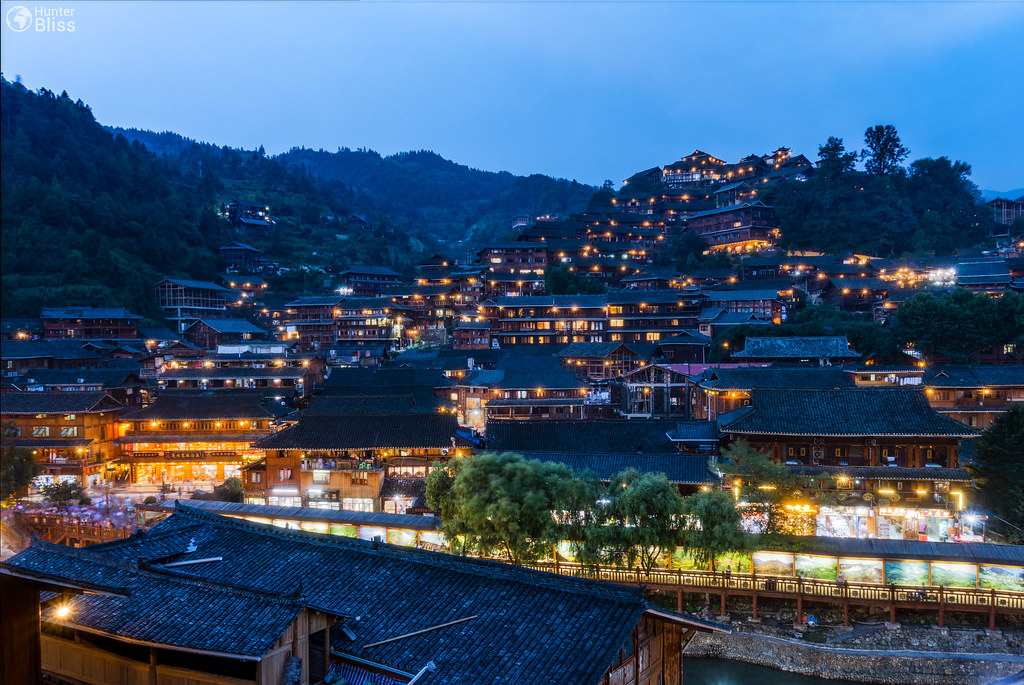
Jiutian Shengmu Miao.
Cultural Etiquette
- Respect Traditions: When visiting the temple, dress modestly and be respectful of the rituals taking place.
- Photography: Always ask for permission before taking photos of people or sacred spaces.
- Engagement: The Miao people are known for their hospitable nature. Engage with locals, but be mindful of their customs and traditions.
Nearby Attractions
- Leishan: A short trip from Jiutian Shengmu Miao, this town is known for its stunning rice terraces and mountain views.
- Xijiang Qianhu Miao Village: Just a short drive away, this is one of the largest Miao villages in China, offering a more commercialized yet still culturally rich experience.
- Mt. Leigong: Ideal for hiking and exploring the natural beauty of the region.
Accommodation Options
While there are a range of accommodations in Kaili, consider staying in a local guesthouse or a homestay in a Miao village for a more authentic experience. This allows you to immerse yourself in the local culture and enjoy home-cooked meals.
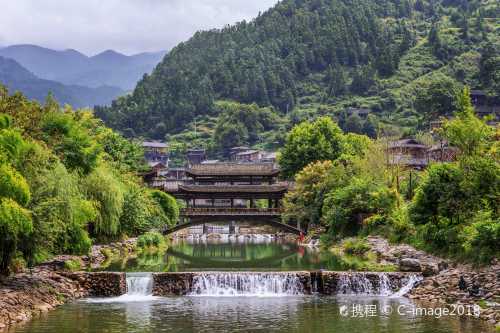
Jiutian Shengmu Miao.
Practical Tips
- Language: While Mandarin is widely spoken, learning a few basic phrases in Chinese can enhance your experience and help you connect with locals.
- Currency: The local currency is the Chinese Yuan (CNY). Ensure you have cash on hand, as credit cards are not universally accepted in rural areas.
- Connectivity: Mobile reception is generally good in Kaili, but you may encounter areas with limited service in more remote villages.
By planning your visit thoughtfully, you will not only appreciate the spiritual significance of Jiutian Shengmu Miao but also gain insight into the rich tapestry of Miao culture and history. Enjoy your journey!
Tickets: Prices, Booking, and Tips
Exploring Jiutian Shengmu Miao (九天圣母庙): Ticketing, Booking, and Helpful Tips
If you’re planning a visit to Jiutian Shengmu Miao, an enchanting temple nestled in the heart of Miao culture, it’s essential to know the details regarding tickets, booking, and some insider tips to enhance your experience.
Ticket Information
-
Entrance Fee: The ticket to Jiutian Shengmu Miao is modest, typically around 40-60 RMB (approximately $6-9 USD). This fee often includes access to the temple complex and may cover a guided tour or cultural performances.
-
Discounts: Reduced prices may be available for students, seniors, and children, so it is advisable to carry valid identification to avail these discounts.
-
Payment Methods: Tickets can usually be purchased at the entrance. However, with the increasing use of digital payments in China, you may also find options to buy tickets through popular local apps like WeChat or Alipay. Having cash on hand is a wise backup, especially in more remote areas.
Booking Tours
While visiting the temple individually is a rewarding experience, consider booking a guided tour for deeper insights into Miao culture and history. Here are some recommended options:
-
Cultural Tours: Many travel companies offer day trips or multi-day packages that include visits to Jiutian Shengmu Miao alongside other attractions in the region. Prices vary depending on the duration and inclusions, typically ranging from 460 RMB (around $70 USD) for a short cultural tour to several thousand for extensive itineraries.
-
Private Tours: For a more personalized experience, consider a private tour. These can be tailored to your interests and may include activities such as traditional dance performances, local crafts workshops, and tastings of Miao cuisine.
-
Online Booking: Websites like TripAdvisor, Viator, or local Chinese travel platforms can help you compare options and book in advance. This is particularly useful during peak tourist seasons when spots may fill quickly.
Tips for a Memorable Visit
-
Timing Your Visit: Aim to visit early in the morning or late afternoon to enjoy a quieter atmosphere. The temple is particularly stunning during sunrise and sunset when the light casts a magical glow over the structures.
-
Cultural Etiquette: Respect local customs and traditions. When entering the temple, dress modestly and be mindful of worshippers. It’s also courteous to ask before taking photographs of locals, especially during rituals.
-
Stay Hydrated: If you’re exploring the area around Jiutian Shengmu Miao, prepare for a day of walking. Bring water and snacks, as options may be limited nearby.
-
Explore Beyond the Temple: The surrounding area boasts beautiful landscapes and authentic Miao villages. Consider extending your visit to include nearby attractions such as rice terraces, traditional Miao markets, and local craft workshops.
-
Learn Basic Mandarin: While many guides speak English, learning a few basic phrases in Mandarin can enhance your interactions and show respect for the local culture.
By following these guidelines, your visit to Jiutian Shengmu Miao will be both enriching and enjoyable, allowing you to delve into the rich tapestry of Miao history and culture while creating lasting memories.
How to Get There: A Complete Transportation Guide
Navigating to Jiutian Shengmu Miao (九天圣母庙)
Visiting the Jiutian Shengmu Miao, a sacred temple nestled in the heart of Miao culture, offers travelers a unique glimpse into the rich tapestry of Chinese history and spirituality. However, reaching this remote gem requires a bit of planning. Here’s a comprehensive guide to help you on your journey.
Getting to Kaili
By Air:
– Nearest Airport: The closest airport is Kaili Huangping Airport (KJH), located approximately 38 kilometers from the city center. This airport offers limited domestic flights.
– From the Airport: Upon landing, you can take a taxi or arrange for a pickup through your accommodation. The drive to Kaili takes about 40 minutes.
By Train:
– Train Services: Kaili is well-connected by train to major cities like Guiyang. High-speed trains run frequently, making the journey from Guiyang to Kaili in about 2-3 hours.
– Train Station: The Kaili Railway Station is centrally located, and from there, you can easily find taxis or public transport to reach your destination.
By Bus:
– Long-Distance Buses: Buses from major cities such as Guiyang and Zhangjiajie frequently arrive at the Kaili bus station. The journey typically takes around 3-4 hours from Guiyang.
– Local Transport: Once you arrive at the bus station, local taxis and ride-sharing services are available to take you to the temple.
Reaching Jiutian Shengmu Miao
From Kaili City Center:
– By Taxi: The most convenient way to reach Jiutian Shengmu Miao is by taxi, which will take approximately 20-30 minutes, depending on traffic. Ensure you have the name written in Chinese (九天圣母庙) to show the driver.
– Public Transport: Alternatively, you can take a local bus. Look for routes that head towards Sankeshu Town, where the temple is located. Buses may run less frequently, so check local schedules in advance.
Local Transportation Tips
- Language Barrier: English is not widely spoken in this region. Consider downloading a translation app or learning a few basic Mandarin phrases to facilitate communication.
- Cash is King: While larger establishments may accept credit cards, many local businesses and transport services operate on cash. Ensure you have sufficient yuan on hand for your journey.
- Stay Connected: Consider purchasing a local SIM card for your phone to access maps and transportation apps while you explore.
Suggested Itineraries
- Cultural Tours: Many travelers opt for organized tours that include Jiutian Shengmu Miao along with visits to surrounding Miao villages. These tours often provide transportation and guide services to enhance your experience.
- Combine with Other Attractions: If time allows, consider visiting nearby sites such as the rice terraces of Leishan or the vibrant Sunday market in Kaili to enrich your cultural immersion.
Conclusion
Reaching Jiutian Shengmu Miao is a rewarding experience that offers insight into the Miao culture and its spiritual heritage. With proper planning and an adventurous spirit, your journey will not only bring you to this sacred site but also allow you to explore the captivating landscapes and traditions of Guizhou Province. Safe travels!
Local Cuisine and Accommodation Nearby
Exploring the rich tapestry of Miao culture at Jiutian Shengmu Miao Temple (九天圣母庙) is not just about the breathtaking scenery and historical significance; it also offers a delightful journey into local flavors and accommodations that reflect the heritage of the region.
Culinary Delights
When you visit Jiutian Shengmu Miao, treat yourself to the unique culinary experiences that the Miao people offer. The local cuisine is characterized by its bold flavors and traditional cooking methods, often utilizing fresh and locally sourced ingredients. Here are some dishes you absolutely must try:
-
Sour Fish Soup (酸汤鱼): A staple of Miao cuisine, this dish features fresh fish simmered in a tangy broth made from fermented vegetables and herbs. The unique sourness is both refreshing and invigorating.
-
Miao Rice Wine (米酒): No visit would be complete without sampling the locally brewed rice wine. Traditionally served in a cow horn, this sweet and slightly alcoholic drink is a cultural highlight and often accompanies meals.
-
Sticky Rice Cakes (糯米糕): These sweet, chewy cakes are made from glutinous rice and can be filled with various fillings, such as red bean paste or nuts. They make for a delicious snack while you explore.
-
Grilled Spicy Chicken (辣子鸡): This dish consists of chicken marinated in a spicy sauce, grilled to perfection, and often served with a side of fresh vegetables. The smoky flavor combined with the heat makes it a favorite among locals and visitors alike.
-
Vegetable Stir-fry (炒菜): Miao cuisine emphasizes fresh vegetables, often stir-fried with garlic and spices. The variety changes with the seasons, ensuring that every bite is bursting with flavor.
Local Accommodation
To fully immerse yourself in the Miao culture, consider staying in nearby accommodations that reflect the local architecture and hospitality. Here are some excellent options:
-
Miao Guesthouse (苗族客栈): Nestled in the heart of the village, this charming guesthouse offers traditional Miao-style rooms, complete with wooden furnishings and scenic views of the surrounding mountains. Guests can enjoy home-cooked meals and participate in cultural activities.
-
Nanhuamiao Village Homestay (南花苗民宿): This homestay allows you to experience the daily lives of the Miao people. With cozy rooms and a friendly atmosphere, it’s an ideal place to engage with local customs and cuisine. The hosts often share stories and folklore that enrich your understanding of the culture.
-
Leigong Mountain Hotel (雷公山酒店): Located a short distance from Jiutian Shengmu Miao, this hotel combines comfort with access to nature. Modern amenities and traditional decor create a tranquil retreat, perfect for unwinding after a day of exploration.
-
Xijiang Miao Village Hotel (西江苗寨酒店): Situated close to the famous Xijiang Miao Village, this hotel offers convenient access to cultural performances and local markets. The rooms are well-appointed, and the onsite restaurant serves delicious Miao dishes.
Conclusion
Whether you’re savoring the local cuisine or indulging in the warmth of Miao hospitality at a nearby accommodation, your experience at Jiutian Shengmu Miao Temple will be enriched by the flavors and traditions of the region. Dive into this vibrant culture and create lasting memories that go beyond the visual splendor of this beautiful area.
Frequently Asked Questions
Common Questions About Jiutian Shengmu Miao (九天圣母庙)
1. What is Jiutian Shengmu Miao?
Jiutian Shengmu Miao, also known as the Temple of the Nine Heavens Holy Mother, is a culturally significant Miao temple located in Kaili, Guizhou Province. It is revered as a spiritual site dedicated to the worship of the Miao goddess, Jiutian Shengmu, reflecting the rich traditions and beliefs of the Miao ethnic group.
2. How do I get to Jiutian Shengmu Miao?
You can reach Jiutian Shengmu Miao by taking a bus or taxi from Kaili city center. The temple is about 10 kilometers away from the city, making it an accessible destination for a day trip. Be sure to check local transportation schedules for the most convenient options.
3. What should I wear when visiting the temple?
Visitors are advised to wear comfortable, modest clothing when visiting Jiutian Shengmu Miao. As a religious site, it is respectful to dress appropriately. If you plan to participate in any ceremonies or rituals, consider wearing traditional Miao attire, which can often be rented or purchased from local vendors.
4. Are there any entrance fees?
Yes, there is a small entrance fee to visit Jiutian Shengmu Miao. This fee typically includes a welcome drink of local rice wine and may also cover participation in cultural performances or events that take place at the temple.
5. What cultural experiences can I expect?
Visitors to Jiutian Shengmu Miao can enjoy a variety of cultural experiences, including traditional Miao singing and dancing performances, guided tours explaining local customs, and opportunities to taste authentic Miao cuisine. Engaging with the local community provides a deeper understanding of Miao culture and traditions.
6. Is there a best time to visit?
The best time to visit Jiutian Shengmu Miao is during local festivals, such as the Tianhua (Flower Dance) Festival, which showcases vibrant costumes and traditional dances. Additionally, spring and autumn are ideal for pleasant weather and stunning views of the surrounding landscape.
7. Can I take photographs at the temple?
Photography is generally allowed at Jiutian Shengmu Miao, but visitors are encouraged to be respectful of the local customs and the privacy of worshippers. It’s always a good idea to ask permission before photographing individuals, especially during religious ceremonies.
8. What should I know about Miao customs before visiting?
Understanding some basic Miao customs can enhance your visit. For instance, it is customary to greet locals with a smile and a nod. When offered rice wine, it is polite to accept and take a sip. Additionally, showing respect for their traditions, such as participating in ceremonies, is appreciated and fosters a meaningful connection with the community.
Final Thoughts on Your Trip
As you wrap up your journey to Jiutian Shengmu Miao, take a moment to reflect on the rich tapestry of culture, history, and natural beauty that this enchanting region offers. Your experiences here are not just about visiting a destination; they are about immersing yourself in a vibrant way of life that has thrived for centuries.
From the moment you entered the bustling Sunday market in Kaili, where locals gather to trade goods and stories, to the serene landscapes of rice terraces and the majestic Mt. Leigong, every moment has woven a narrative of the Miao people—an ethnic group renowned for their resilience and artistry. Engage with the locals, savor their homemade rice wine, and participate in lively dances; these experiences are not mere performances but a glimpse into a culture steeped in tradition and pride.
Highlights to Remember:
- Cultural Immersion: Enjoying a warm welcome with traditional songs and dances.
- Authentic Encounters: Meeting Miao families and sharing meals made from cherished recipes.
- Stunning Landscapes: Hiking through breathtaking mountains and terraced fields that have sustained generations.
As you leave this remarkable area, carry with you not just photographs but also the stories of the people you’ve met and the traditions you’ve witnessed. The essence of Jiutian Shengmu Miao will linger in your heart, inspiring you to continue exploring the world with an open mind and a deeper appreciation for cultural diversity.
May your travels ahead be filled with curiosity and discovery, echoing the spirit of the Miao community that welcomes all with open arms. Safe travels!